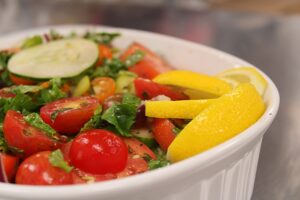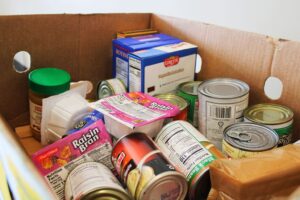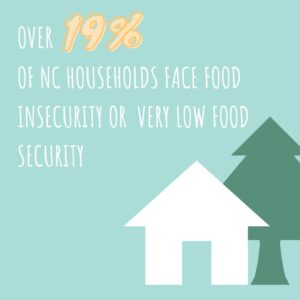Nutrition Program Kicks Off at the Durham Community Food Pantry
 A grand opening, developing a new nutrition program, and adapting all of this to COVID-19. These are all things the Durham Community Food Pantry (DCFP) has accomplished over the past 18 months.
A grand opening, developing a new nutrition program, and adapting all of this to COVID-19. These are all things the Durham Community Food Pantry (DCFP) has accomplished over the past 18 months.
The DCFP opened its doors to the community in May 2019, after moving from a small office on University Drive, to a 7,400 square foot facility in the Lakewood Shopping Center. With the expanded capacity, Catholic Charities looked to pair a nutrition program with the distribution of food to provide more comprehensive services for families.
In 2019, Catholic Charities staff became aware of a grant opportunity through AmeriCorps, facilitated by Catholic Charities USA, to support hiring a staff member to run a nutrition program. Staff were excited by this opportunity and began planning how to implement it.
“Work on this grant opportunity began in the summer of 2019, long before COVID was an issue,” shared Mr. David Juarez Torres, program director for the Durham Community Food Pantry. “However, by the time the grant was submitted, awarded, and the hiring process was completed, it was June 2020.”
This meant that Ms. Mary Drue Hall, the new nutrition specialist, was starting a new job with a new program in the middle of a pandemic.
“It was really hectic. Not only was I starting a new position in COVID, but the position itself was new, so it didn’t have a lot of established guidelines,” shared Hall. “I had a blank slate with a lot of room to grow. I think this was a great opportunity for me and for our food pantry to set up new ideas and new programs.”
However, for Hall, she has experience getting a lot done in a short amount time. She graduated from UNC Chapel Hill in three years with a degree in contemporary European studies and minors in history and social justice. She accomplished this by starting UNC having already completed credits through AP credits, knowing what she wanted to study, and staying focused on that plan

Similar to her experience at UNC, Hall is starting at the DCFP with a head start. She expects to draw on influences from her Social Justice studies and her college advisor who focused on the Sociology of Food and Food Insecurity as she helps to build the nutrition program.
“Thinking about nutrition doesn’t happen in a vacuum,” shared Hall. “It goes beyond simply identifying what is healthy and what is not healthy. You must recognize other factors such as access barriers and how physical and mental health affects nutrition. You must consider everything going on in our clients’ lives.”
With the opportunity to build something new during these unprecedented times, and something that takes into consideration the various challenges affecting nutrition, Hall has been working to find creative ways to serve the community. One way Hall looks to understand the challenges families face is by understanding what ingredients are most easily accessible.
“Fresh produce can be expensive and requires frequent trips to the store,” shared Hall.
While the DCFP works to distribute some fresh produce with help from the Inter-Faith Food Shuttle and the Food Bank of Central and Eastern North Carolina, that cannot be the only solution. Hall is working to gather healthy and delicious recipes which can be made from what families typically receive from the DCFP. This means avoiding recipes that require unique spices that are uncommon and expensive and using canned or frozen vegetables to create a balanced meal.

Due to COVID-19, safety regulations have forced the nutrition program start virtually. Through the DCFP website and social media posts on Instagram and Facebook, Hall shares healthy recipes, facts about nutrition, and info graphics encouraging healthy practices for the community.
Once in person services resume, Hall expects the program to be much more hands-on. The DCFP will host interactive cooking classes, distribute free samples of recipes as guests wait for their groceries, share child focused educational materials, and conduct skills workshops on topics such as proper knife usage.
Hall has big hopes for growing the program and will need help from the public. Volunteers are already testing recipes in their own homes and reporting on what tasted good and what should remain in a cook book. There are also volunteers who have experience in horticulture and gardening who are exploring ways to help guests grow some of their own food. Anyone interested in volunteering should contact Hall by calling (919) 286 – 1964 or by email at MaryDrue.Hall@ccharitiesdor.org To learn more about the Durham Community Food Pantry or how you can support its programming, please visit www.CatholicCharitiesRaleigh.org/dcfp.
